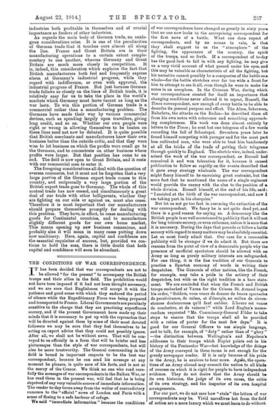COMMERCIAL POSSIBILITIES OF THE WAR.
IT is gratifying to find that the public is rapidly waking up to the fact that other prospects than those of universal unemployment arise out of the present war. The daily papers of this week, instead of talking of the necessity for relief funds, have begun to talk of the tremendous commercial possibilities revealed for Great Britain by the collapse of Germany's oversea commerce. The main cause of that collapse everybody now understands. It is due to England's possession of superior sea-power. In addition, it must be noted that many German manufacturing concerns have been obliged to shut down because their work-people have gone to the front. This factor would have affected German commerce even if Germany had kept the seas open, and it has the additional dis- advantage for her that it robs her of the chance of carrying on land commerce with the few countries of Europe that still remain neutral. It must also very greatly interrupt her purely internal commerce, and deprive her people of the means of creating wealth with which to pay for the war.
What we are mainly concerned with, however, is the possibility of taking Germany's place in the oversea markets which she can no longer supply. The interests at stake are enormous. Germany has been building up at an even more rapid rate than Great Britain herself an export industry, a large part of which goes across the seas. indeed, the growth of German exports has been so rapid in the last few years that if the present war had not i occurred it s quite possible that they would shortly have exceeded British exports. The figures are very striking, and can best be put in tabular form :— EXPORTS OF DOMESTIC PRODrCE.
From 1903 1908 1913
..e "United Kingdom ...
290,800,000 377,104,000 U5,461,000 Germany ... 246,551,000 314,627,000 504,000,000
If we compare these figures, it will be seen that Germany has more than doubled her export trade in ten years, while Great Britain has rather less than doubled hers. That comparison alone would not be conclusive, because a smaller figure can be more easily doubled than a.
large figure. But if we examine the figures in another way, we shall see that the addition to German trade in the ten years is greater than the addition to British trade. In the same way the addition to German trade in five years is greater than the addition in the same period to British trade. These facts are certainly significant, and help to increase our wonder that Germany, when so obviously expanding her power, should have risked ali on what may prove little better than a gambler's throw.
It is our business now to see that this gambler's throw turns out badly for her. Part of the work has already been done by our Navy in clearing the seas of German commerce. It remains for our manufacturers to clear oversee, markets of German trade. The immediate opportunities are extraordinarily good. Already in many markets of the world previous customers of the German Empire must be feeling the want of the goods they have been in the habit of buying. They would naturally look to the other great commercial countries of the world to fill the void, and it depends upon the enterprise of British merchants and manufacturers whether British trade or American trade gets the bulk of the new commerce that is waiting to be picked up. That active movements are already on foot among business men in this country is certain. One hears stories on all bands of enterprising firms who are beginning to make plans for new develop- ments to meet the wants of the British Colonial and the South American markets. It may be that for a short time the movement will be hampered by the same cause that is checking many of our normal industries at the present moment—namely, financial restriction. Until finance begins once again to run its normal smooth course fresh developments requiring capital must be checked. There is, however, good reason to hope that the present financial restriction will not be of long duration, and the moment it ends we may expect a burst of industrial activity.
But the problems to be overcome are by no means simple. A good deal of the German success in business is undoubtedly due to the excellence of the articles that German manufacturers produce, and that in turn cau is many cases be traced to laborious scientific investigation. This is specially true of the chemical industries, where, by the admission of everybody, Germany has obtained a. lead over Great Britain by the methodical application of science to industry. She has also, it must be added, carefully guarded her position by taking out a number of patents in this and other countries, and British manu- facturers have for some time been complaining that they have been unable to develop their own chemical industries because they were hampered in many directions by German patents. It may be assumed that during war time the validity of British patents owned by German subjects automatically ceases. At any rate, no action for an infringement of the patent could possibly be brought in a British Court. So that even without special legislation the patent difficulty would disappear while the war lasts. As a matter of fact, however, the Board of Trade took the precaution of asking Parliament to pass a short Act— among the bundles of Acts which were rushed through a fortnight ago—which gives to the Board power to deal with the whole question of patents owned by the subjects of Powers at war with Great Britain. But something more is needed than the mere cancelling of German patents. It is by no means certain that we have available in this country a sufficient supply of men to undertake the work which has been so well done by the skilled chemists of Germany. Still, there are some, and if British capitalists will have the enterprise to launch out in these new directions they may win for Great Britain
industries both profitable in themselves and of crucial importance as feeders of other industries. As regards the main body of German trade, no analo- gous considerations arise. It is one of the peculiarities of German trade that it touches ours almost all along the line. France and Great Britain are in their manufacturing operations to a certain extent comple- mentary to one another, whereas Germany and Great Britain are much more closely in competition. It is, indeed, this consideration which explains the fact that British manufacturers both feel and frequently express alarm at Germany's industrial progress, while they regard with indifference, or even with approval, the industrial progress of France. But just because German trade follows so closely on the lines of British trade, it is relatively easy for us to take the place in the world's markets which Germany must leave vacant as long as the war lasts. To win this portion of German trade is a commercial rather than a manufacturing problem. The Germans have made their way by various commercial devices, such as spending largely upon travellers, giving long credit, and so on. Whether our own people were right or wrong in allowing themselves to be beaten on these lines need not now be debated. It is quite possible that British merchants and manufacturers knew their own business better than the outside critic, and that they were wise to let business on which the profits were small go to the Germans, and to concentrate on other business where profits were larger. But that position has come to an end. The field is now open to Great Britain, and it rests with our commercial men to enter it.
The foregoing considerations all deal with the question of oversea commerce, but it must not be forgotten that a very large portion of the German export trade comes to this country, and reciprocally a very large portion of the British export trade goes to Germany. The whole of this mutual trade has now ceased, and simultaneously a great deal of our trade with other belligerents, whether they are fighting on our side or against us, must also cease. Therefore it is most important that our manufacturers should prepare themselves promptly for dealing with this problem. They have, in effect, to cease manufacturing goods for Continental countries, and to manufacture slightly different goods for our own home market. This means opening up new business connexions, and probably also it will mean in many cases putting down new machinery. Here, again, capital and confidence are the essential requisites of success, but, provided we con- tinue to hold the seas, there is little doubt that both capital and confidence will soon be abundant.



































 Previous page
Previous page